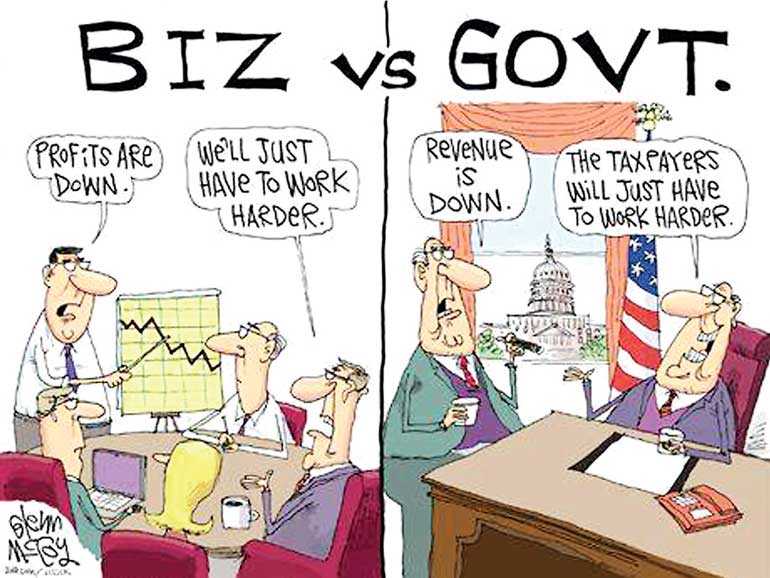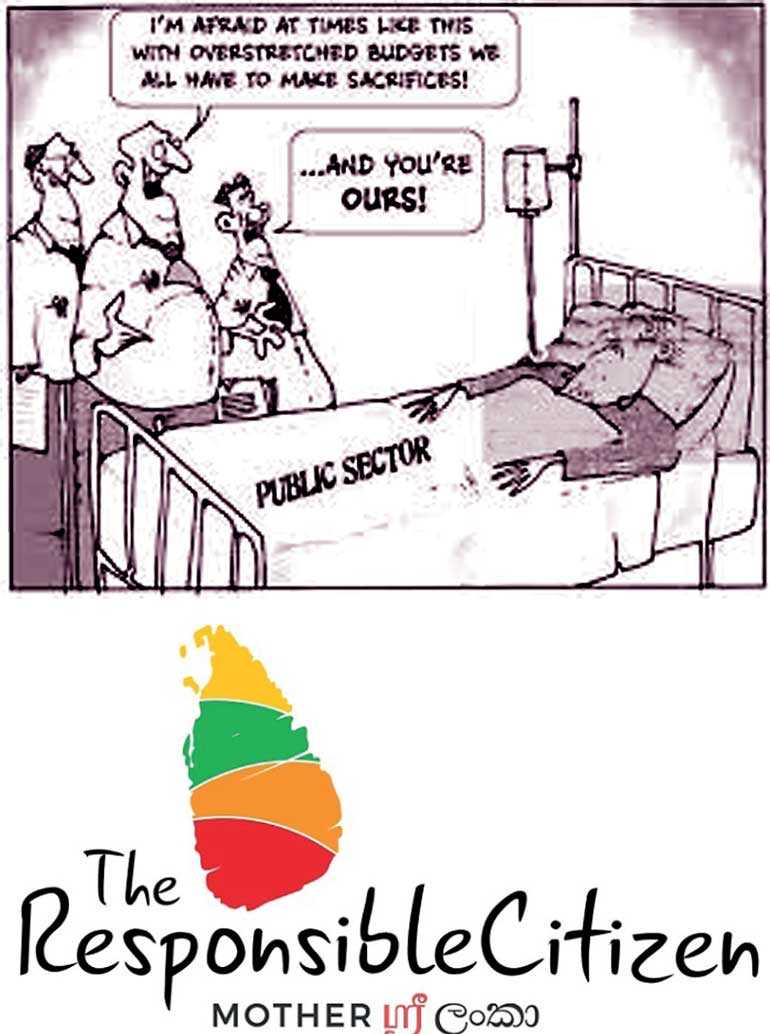Saturday Feb 14, 2026
Saturday Feb 14, 2026
Wednesday, 29 August 2018 00:00 - - {{hitsCtrl.values.hits}}


 During my tenure in the Government I got an opportunity to work in several different roles, through which I experienced first-hand the pros and cons of the way the Government is run. I describe below some of my observations.
During my tenure in the Government I got an opportunity to work in several different roles, through which I experienced first-hand the pros and cons of the way the Government is run. I describe below some of my observations.
The objective of my article is not to criticise or praise any side, but to share some of my thoughts and learnings as a person who sacrificed very attractive jobs in the private sector and joined the public sector to serve my country and served it for seven years honestly and diligently.
After 19 years in the private sector and seven years in the public sector, there are so many learnings that are worth penning down into a book. The sum up of this experience is that there are so many good things in each sector and if we can combine the two, we will have a very effective mechanism to run each sector. Now that can be called a Private-Public-Partnership (PPP) wouldn’t it?
Even though my private sector colleagues may not agree, believe me there are many good practices in the public sector that the private sector can learn from too. Further, I am saying with conviction that there are so many useful things in the private sector corporate culture and management styles that can do a vast amount of good to improve the performance of the public sector.
For example, there is hardly any performance-based evaluation for promotions in the public sector, whereas in the private sector there is hardly any company without it. However, I learnt that the public sector believe that leaving your evaluation to the supervisor could be very subjective and leaves room for favouritism and revenge. Hence, they believe that the evaluation based on number of years in the job is much more objective and not subject to an individual’s opinion. This could probably be the reason why there are many more females in senior positions in the public sector than in the private sector since their evaluations were not left to some individuals.
On the other hand, the lack of performance-based evaluations in the public sector makes it very difficult to get the staff to be productive and be results oriented. Further, measuring the performance is also a difficult task in the public sector since most public sector institutions are not tied to a top line or a bottom line financial targets. Hence, it is only a results based evaluations that can be used which is rather complex to measure as well.
My first job at the public sector was at the Presidential Secretariat, so yes, I did not go through the ranks, but was fortunate enough to land at the highest office in the sector. I was in total culture shock. I would say that I had never got over the culture shock even when I left seven years later.
My first experience was in the working hours. Around the third or fourth day in office, at about 5:30 p.m. I was still working as I was used to in the private sector when I noticed a man walking past my door several times. Finally, I peeped to see who it was. It was the security guard, who asked, “madam, gedara yanne nadda? Mata office eka wahanna oney!” There are so many other snippets and interesting experiences that I went through which I will have to save for another day.
Handing over of work
One of the main issues I see in the public sector is that there is no handing over of work, from one regime to another, nor even from one minister to another or from one secretary to another even within the same Government. Did you know that even though the US elections are held in November, the taking of oaths and starting work of the new President happens in January? The period between is used for the incumbent President to hand over work and the other to select his team and get ready. In our case, do the incumbent and the President elect even meet to say goodbye? I think we are so naïve in these practices.
During my tenure in the Government, I was handling the work of the Food Security and Cost of Living Cabinet Subcommittee, chaired by the President. This committee was set up during the food crisis in 2008 when the inflation was around 30% and toil was over $ 100 per barrel. During 2008-’09 the committee met every week on Tuesdays and later on when the inflation was brought down to single digits level and cost of living was under control, the committee gradually reduced the frequency of the meetings to once a month.
It was as a result of some of the projects recommended by this committee that we became self-sufficient in rice, set up the urban whole sale centres in Narahenpita and Ratmalana to ease the cost of food for the urban poor, introduced plastic crates for vegetable and fruits transportation to minimise post-harvest waste, pretty much brought the paddy mafia under control through innovative market interventions, strengthened Sathosa to be a competitor to the private retail sector, initiated many programs to increase production of dairy, maize, chillies, onions, etc.
All this was possible since every minister who had a ministry that can influence cost of living was present at the meetings, the leadership from the top signalled to everyone how important this is. I was heading the Functional Group which was responsible for preparing the thorough presentations which involved compilation of data from over 10 different agencies, analysing and interpreting the data and presenting them with recommendations and strategy options to go forward. I made 48 detailed presentations to them over a seven-year period. The committee met regularly and took decisions in consultation with all line ministries and my office was responsible to follow up with the implementation.
During this time, there were so many changes in the ministers and secretaries handling the subjects. Every time a new minister and secretary was appointed, I went and briefed them about the work of this committee since I was interested in the continuation of the work of the Cabinet Subcommittee. That is when I first realised about the lack of handing over and it was very clear why most of the projects started during one minister do not get carried forward by the next.
The most disappointing fact is that, even though we the people knew that this happens when governments change, but actually it happens even when the subject minister changes during the same government’s rule. We can see this happening even now very clearly with over three Cabinet reshuffles that have happened during the current Government’s three-year rule.
I faced this same serious issue during my other positions as Chairperson of RDB bank and the Tea Board. The newcomer will take over and start something new on their own, most probably re-inventing the wheel. And we as a country are back to square one, over and over again! In fact when the elections results were announced on 8 January 2015, many called me and told me to go and collect my files from the office; and my reply to them was, the files contain all the work I did for the institution and there’s nothing that I want to take, but rather I am waiting to know who will be my successor so that I can go and handover the work.
Political appointments
Throughout my career in the public sector, I had to work with many politicians. There were some who interfered at every step of the way and some others who gave you total independence to carry out your work as long as they can trust you and have confidence in you. I was totally new to this; I thought that if I do the right thing, it will be accepted.
One of the biggest problems that officials face is having to tackle the appointment of staff to the various institutions that come under a particular ministry. I am of the view that if the persons are qualified and possess the entry criteria in terms of experience, there is no harm in hiring them even if they came through a politician. However, the problem arises when the candidate sent by the politician lacks most of the criteria and will definitely add no value to the institution. In this case an official is faced with the difficult task of doing what’s best for the institution you are heading and the country vs. what your boss wants.
Many times in situations like this, I was told to learn politics. I was told very frankly that ‘we appointed you so that you will give jobs to our supporters’. The politician’s point is that if they can’t provide jobs to their supporters, they will not get any help from these people when elections come next time around. For almost all of them, understandably, staying in power at any cost is more important.
From my point of view, as a professional holding the post of Chairman of the institution, I wanted to do what’s best for the institution and country. So, unless we find an alternate model for the politicians to find manpower and funding to run their campaigns, the government institutions will be subject to this abuse.
One solution to this is to ask the politicians to appoint only the people who fit the right criteria for that job, but I doubt that the majority of the people who work for election campaigns will fit the bill. In fact it has become that those who can’t find a job through their own merit just plug themselves to a politician and serve them in order to get a job in return for their favours.
The other solution is, may be to have a quota of positions for the political appointees who will leave when the minister in charge changes, etc. This is the practice with the appointment to the higher order positions such as heads of institutions who are called political appointees. However, the more smarter option will be to keep the people who are heading the institutions if they are qualified and their performance is good, for a longer period so that they are able to implement something to completion and to get rid of the people who are appointed thorough political influence to the other lower positions when the governments change.
Due to these perceptions about how a head of an institution is appointed, you will be looked down upon by many, especially the public servants who have to work under you even if you have the highest qualifications, experience and capabilities. The common belief is that you are given this job by a politician as a return of a favour, and not because you are qualified to hold the position.
I faced this many times and in fact, a ministry secretary when introducing me to the staff said that I am not a typical political appointee but a professional qualified to hold the job on my own merit. So the way the system is now, even if professionals are selected to hold these top jobs, you are seen by the public sector as inferior since you are labelled as a ‘political appointee’!
Further, I found that the typical public servant (mostly of the older generation) do not have much regard to the private sector experience since they have a perception that the private sector is run with no proper rules and regulations and decisions are made at the whim and fancy of owners. This attitude has to be changed if we are to attract professionals to hold these positions.
Business
through tenders
The other way that the politicians have to return the favours to their supporters is by giving them business through tenders. Even if the politician’s favoured party does not have the necessary knowhow, officers are forced to select these companies. Mind you it is done in such a discreet manner so that no one can be taken to FCID and proven guilty!
The whole responsibility of tender evaluations lies first with the Technical Evaluation Committee and then with the Financial Committee. There are systems that are so archaic and do not meet today’s market conditions. Fixing the tenders to suit favoured contenders are so common that even if you highly suspect this, it will be very difficult to prove; mind you I have tried to prove this but they know the system better than us.
For example, if your market knowledge tells you that even the lowest bid received is way overpriced compared to current market rates, there is nothing you can do since you need a technical fault to cancel a tender and ‘to be within market rates’ is not considered a technical spec. Common sense and market knowledge says this is not a good purchase, but the committee works in a robotic manner, because they have to follow the procedure. So if you cancel it for some technical reason you delay the project, and even if you do, you may end up with the same parties at even higher prices!
However, you can’t put the total blame on the procedures. Since we are in this situation because in the past, people (suppliers and procurement officers) have found ways around each and every system put in place and hence the procedures have been tightened so much it is impossible to get anything done, let alone get anything done on time.
I used to always wonder how come that in the private sector, an individual will be responsible to handle much larger funds with less strict financial and administerial regulations (AR/FR) and still there is less cheating than in the public sector which handles smaller amounts at a time, with a plethora of AR/FR regulations. One cannot help but wonder is it the remuneration of the two sectors that is the cause of this.
Joining the
public sector
Hence, if you decide to join the public sector after making a career in the private sector in order to serve your country, you will have to have enough savings to live a decent lifestyle since the salary scales between the two sectors at senior management levels are almost 10 times different. If you are lucky enough to be financially strong, and hence decide to take the ‘risk’ or the ‘plunge’ and join the public sector, you will have to have an enormous amount of will power, integrity and honesty, self-motivation and the passion to serve your country. If you come without any one of these characteristics “the system is most likely to get you”.
I believe that what needs to be fixed is not the system, but the ethics and values of the people. That’s what I am trying to do through Mother Sri Lanka even in a very small way. Similarly, I believe that what needs to be fixed is not the constitution, but our leaders!
I say this because, whether power is shifted from the Executive President to the Executive Prime Minister or from Central Government to Provincial Governments, if the leaders are not ethical they will abuse these powers. So the need of the hour is professionals who can put country first!
(Dr. Janaki Kuruppu is the Founder and Chairperson of Mother Sri Lanka Trust, a charitable foundation focusing primarily on developing responsible citizenship. She is also a former Chairperson – Sri Lanka Tea Board, first Chairperson – Regional Development Bank, Director – Cargills Group and first MD – Nielsen Lanka.)